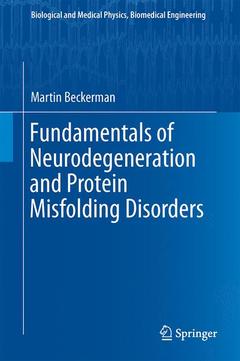Fundamentals of Neurodegeneration and Protein Misfolding Disorders, 1st ed. 2015 Biological and Medical Physics, Biomedical Engineering Series
Auteur : Beckerman Martin

This unique text introduces students and researchers to the world of misfolded proteins, toxic oligomers, and amyloid assemblages, and the diseases of the brain that result. During the past few years the connections between failures in protein quality control and neurological disorders have been reinforced and strengthened by discoveries on multiple fronts. These findings provide novel insights on how amyloidogenic oligomers and fibrils form, interconvert from one state to another, and propagate from cell to cell and region to region. Starting with protein folding and protein quality control basics, the reader will learn how misfolded proteins can cause diseases ranging from prion diseases to Alzheimer?s disease and Parkinson?s disease to Huntington?s disease, amyotrophic lateral sclerosis and frontotemporal lobar degeneration.
Authoritative but written in a clear and engaging style, Fundamentals of Neurodegeneration and Protein Misfolding Disorders addresses one of today?s forefront areas of science and medicine. The text emphasizes the new groundbreaking biophysical and biochemical methods that enable molecular-level explorations and the conceptual breakthroughs that result. It contains separate chapters on each of the major disease classes. Special emphasis is placed on those factors and themes that are common to the diseases, especially failures in synaptic transmission, mitochondrial control, and axonal transport; breakdowns in RNA processing; the potential role of environmental factors; and the confounding effects of neuroinflammation. The book is ideal for use in teaching at the advanced undergraduate and graduate levels, and serves as a comprehensive reference for a broad audience of students and researchers in neuroscience, molecular biology, biological physics and biomedical engineering.
Presents a systematic, textbook-quality treatment of protein misfolding and its central role in neurodegeneration
Provides a foundation for understanding the multiple causes and progression of familial and sporadic forms of neurodegenerative diseases
Contains chapters on each of the major disease classes
Emphasizes the pioneering experimental and computational methods that enable molecular-level explorations and the conceptual breakthroughs they produce
Describes up-to-date theories on the mechanisms underlying amyloid and toxic-oligomer-driven synaptic impairment, neuronal failure, and death
Includes summaries of the main points of each chapter, numerous figures, and key references
Date de parution : 11-2015
Ouvrage de 378 p.
15.5x23.5 cm
Disponible chez l'éditeur (délai d'approvisionnement : 15 jours).
Prix indicatif 105,49 €
Ajouter au panierDate de parution : 08-2016
Ouvrage de 378 p.
15.5x23.5 cm
Disponible chez l'éditeur (délai d'approvisionnement : 15 jours).
Prix indicatif 118,31 €
Ajouter au panierThèmes de Fundamentals of Neurodegeneration and Protein Misfolding... :
Mots-clés :
Abeta, Tau, Alpha-synuclein, Alpha-synucleinopathies, Alzheimer’s Disease, Amyloid Fibrils, Amyloid Oligomers, Amyloids, Amyotrophic Lateral Sclerosis, Huntington’s Disease, Intracellular Inclusions, Neurodegeneration, Parkinson‘s Disease, Prions, Protein Misfolding, TDP-43, TDP-43 Proteinopathies, Tauopathies, Unstructured Proteins



